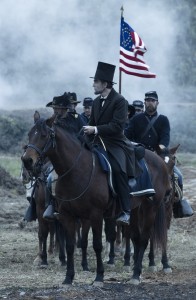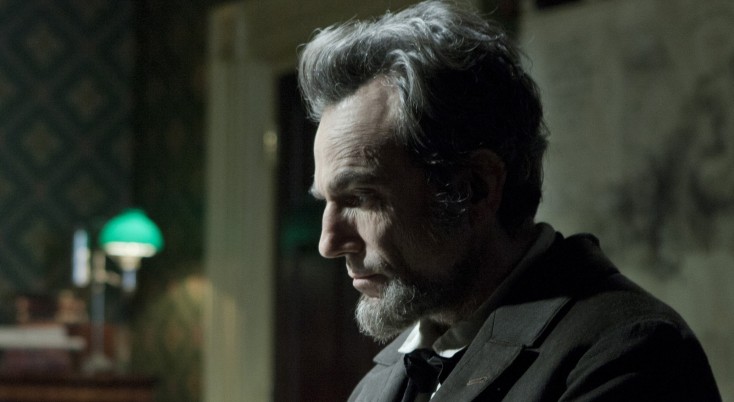
President Abraham Lincoln (Daniel Day-Lewis) looks across a battlefield in the aftermath of a terrible siege in this scene from director Steven Spielberg’s drama “Lincoln.” ©Dreamworks II Distribution Co./20th Century Fox.
By ANGELA DAWSON
Front Row Features
HOLLYWOOD—Steven Spielberg has had a passion for Abraham Lincoln since he was a youth. He was long interested in making a movie about the 16th president, but he wasn’t sure exactly how to tell the story of his personal hero until he met with Lincoln historian/author Doris Kearns Goodwin, and then with award-winning playwright Tony Kushner (“Angels in America”) several years ago.
Of course, finding the right actor to play the Great Emancipator, who governed America during its darkest days—the Civil War—was also a key component to bringing his vision to life. He found that person in Academy Award winning actor Daniel Day-Lewis, the chameleon-like performer who transformed himself physically and immersed in American history to play the president. The Irish actor served as the perfect blank canvas for Spielberg’s vision of the man who saved the country. Instead of documenting Lincoln’s entire life, though, the Academy Award winning filmmaker chose to focus on the leader’s efforts to pass the 13th Amendment to the U.S. Constitution abolishing slavery in the U.S. To Lincoln, passing the amendment was even more pressing than ending the war with the south.
Spielberg and Day-Lewis recently spoke about making “Lincoln,” which serves as more than a history lesson about an American icon. It is a study of the man, and how his personal beliefs and ideals guided him to push for a cause he deeply believed in.
Q: Steven it seems like you’ve wanted to make this movie all your life. What made this a passion project for you?
Spielberg: I’ve just always had a personal fascination with the myth of Abraham Lincoln. Once you start to read about him and the Civil War, and everything leading up to the Civil War, you start to understand that the myth is created when we think we understand a character and we reduce him to a kind of cultural national stereotype. Lincoln has been reduced to statuary over the last 60 years or more because there’s been more written about Lincoln than movies made about him, or television portraying him. He’s kind of a stranger to our industry, to this medium. You have to go back to the 1930s to find a movie that’s just about Abraham Lincoln. So I just found that my fascination with Lincoln, which started as a child, got to the point where after reading so much about him, I thought there was a chance to tell a segment of his life to moviegoers.
Q: Daniel, what did you see as your greatest challenge in bringing this iconic figure to life?
Day-Lewis: Apart from everything, you mean? The most obvious thing is connected to what Steven was saying. I was trying to approach a man’s life because it’s been mythologized to that extent in such a way that you can get close enough to properly represent it, and I just wasn’t sure that I would be able to do that. Beyond that, I felt that I absolutely shouldn’t do it and somebody else should do it instead.
Spielberg: It was hard to get him to say yes.
Day-Lewis: The wonderful surprise with (Lincoln) is that you begin to discover him, and there are many different ways in which you can do that. He kind of welcomes you in; he’s very accessible. That took me by surprise.
Q: What did you each learn about Lincoln that you either did not know previously, or were most surprised by as a matter of delving into historical materials for this film?
Day-Lewis: It’s easy for me because I knew nothing about him, so I had everything to learn. Apart from a few images, a statue, a cartoon, a few lines from the first inaugural address and a few from the Gettysburg Address—that would be my entire knowledge of that man’s life. The most delicious surprise for me was the humor. That was an important aspect of his character.
Q: And you, Mr. Spielberg?
Spielberg: There are so many things I didn’t know and there are so many different points of view about Lincoln. With over 7,000 books written (on Lincoln), to find any five books that agree on every single facet of his life is difficult. The thing that really surprised me about Lincoln was the weight of his responsibility. He’s the only president that had the union ripped out from under him and torn in half. The fact that he came through this with a steady moral compass and an even keel just amazes me.
Q: Was there ever a discussion to have more of the Civil War or even Lincoln’s presidency depicted?
Spielberg: (Screenwriter) Tony Kushner’s first draft was 550 pages. But we needed to focus it in on a working president, a father and a husband. You couldn’t do that if this was the Greatest Hits list of Abraham Lincoln, because we would have been dilettantes as filmmakers and actors. We would have just been hitting all the high points, just giving you headlines and not giving you any depth of this character, this man.
Q: Why do you think now is the right for Lincoln’s story, or this chapter in Lincoln’s story, to be told?
Spielberg: I would have been very happy to have made Lincoln in 2000, the year after I met (author/historian) Doris Kearns Goodwin. It took her a couple of years to write the book. It took us more than a couple of years to get the screenplay written. So I wasn’t waiting for a certain time. At one point, I flirted with (the film) coming out on the 200th anniversary of Lincoln’s birth (2009), but we weren’t ready to make the picture then. People say, “Oh you made it because of what’s happening in politics today.” It had nothing to do with the current politics. It had nothing to do with holding a mirror up to the way we conduct our business on Capitol Hill today. This was meant to be a story, a Lincoln portrait if you will, and I think any time is the right time for a compelling story.
Q: Period movies seem to have been out of favor in Hollywood for a while. Why is that?
Day-Lewis: I’m just sort of reflecting a little bit on my entire life and I’m thinking that I spent a certain amount of time in 17th century America (in “The Crucible”), quite a bit of time in 18th century America (in “The Last of the Mohicans”) and so much time in 19th century America in (in “Gangs of New York and “Age of Innocence”) that I don’t know that I’ll ever get out. (He laughs.) So my experience has been that historical movies actually are well represented.
Q: Mr. Spielberg, in deconstructing Lincoln’s image and icon, you had to show him doing certain sort of questionable things in order to get this slavery abolished. Do you feel that there is a message in that, and if so how would we apply that outside of a historical context?
Spielberg: Desperate times require desperate measures. What Lincoln and the lobbyists for the amendment and the manager of the amendment himself (Tommy Lee Jones’ Thaddeus Stevens), what they did to get this passed was not illegal. It was murky, and what they did was noble and grand. To make a movie about a squeaky-clean person whose moral principles hold him so far beyond mortal men would not be interesting to me. I like the fact that there is a bit of murkiness in the politics in the 19th century to do something that was necessary and long lasting.
Q: Daniel, why did you initially pass on playing Lincoln?
Day-Lewis: I didn’t know it was the right choice but I ran out of excuses. I did not want to be responsible for irrevocably staining the reputation of the man. Not just in a self-serving way, but quite literally. It seemed to me a very difficult thing to try and tell that story. I just really felt I wasn’t the person to do that.
Spielberg: But I totally did. I met Daniel eight years ago and couldn’t get him to agree to come down the road with me, and then a couple years ago when Tony Kushner wrote his draft, that was sort of the first shoe in the door that really got us together in Ireland for the first time to talk about it. It was almost like a feasibility study. Daniel was doing a feasibility study to see whether he would allow himself to go near a script that was clearly on the verge of brilliance, and I was just at point, without putting any extra pressure on Daniel because I didn’t say this to anybody, but if he had finally and ultimately said no, I would never have made the movie. Abraham Lincoln just wouldn’t have been in my life anymore. It’d be gone.
Q: Did you intentionally keep this from being released before this year’s Presidential election?
Spielberg: What it was, very simply, is because there’s a lot of confusion about the political ideologies of both parties have switched 180 degrees in 150 years. It’s just too confusing—everybody claiming Lincoln as their own. And everybody should claim Lincoln as their own because he represents all of us. And what he did was basically provide the opportunities that all of us are enjoying today. So I just wanted people to talk about the film, not talk about the election cycle. I thought it was safer to let people talk about the film during the election cycle in this run up with ads on TV and posters going up and all of that. But the actual debut of the film should happen after the election’s been decided. That was my feeling.





